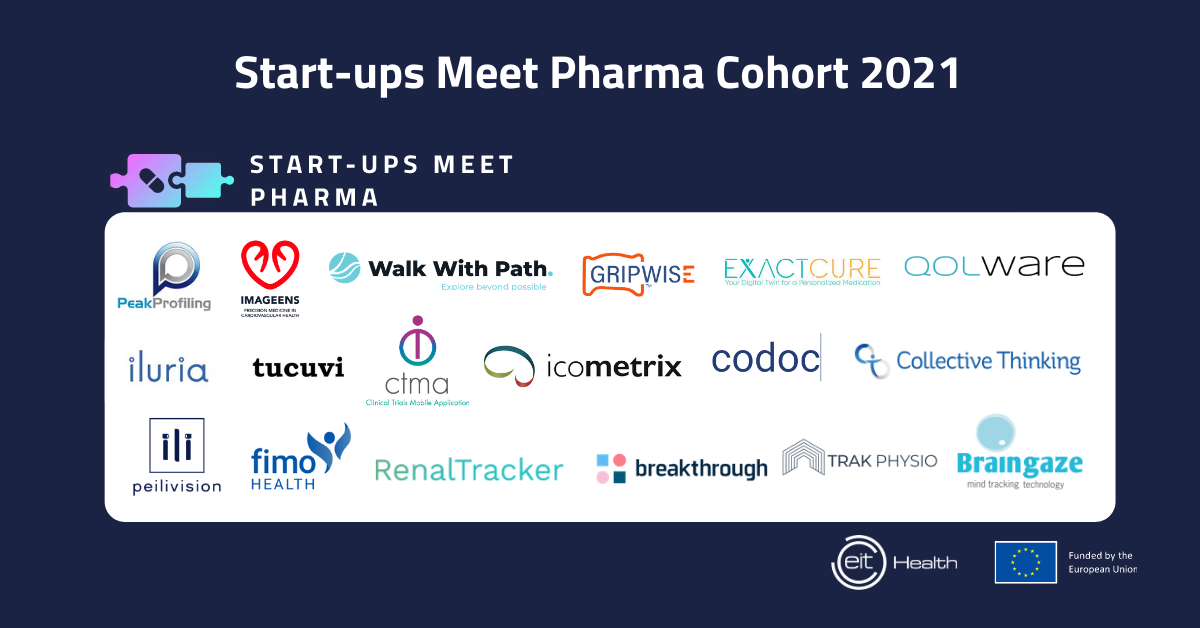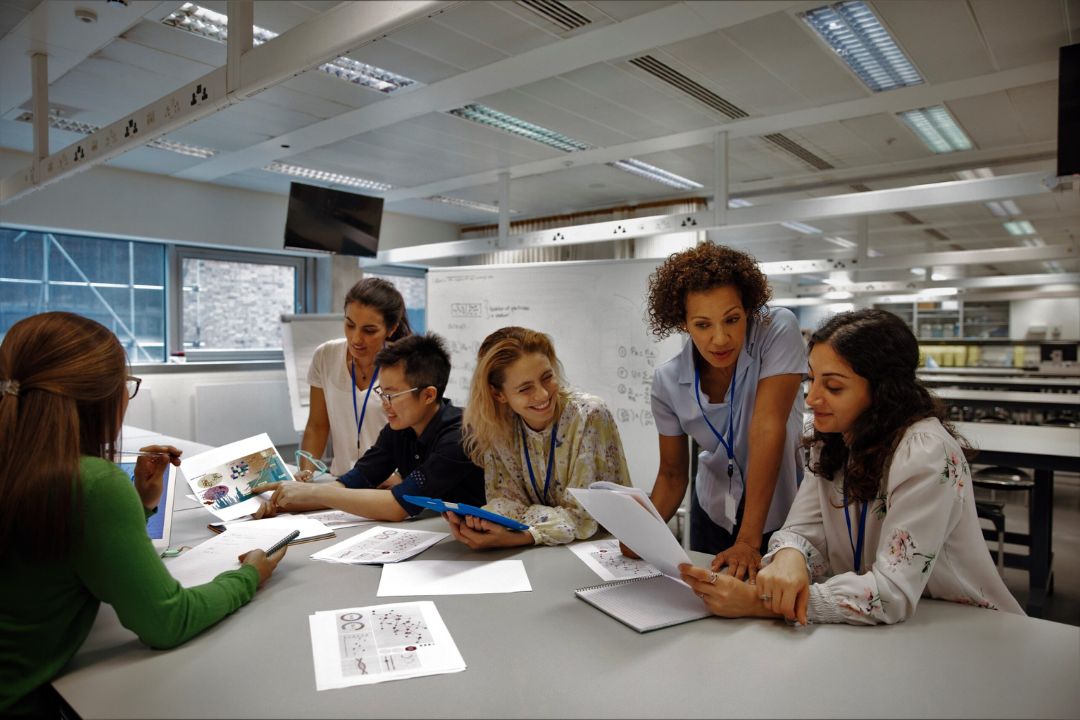11th May 2021
EIT Health Germany welcomes 18 start-ups from across Europe to the 2021 edition of the Start-ups Meet Pharma programme.
In 2021 we partnered with five pharma companies, Abbott, Takeda, Merck, Amgen and AstraZeneca to jointly organize this year’s edition of the Start-ups Meet Pharma programme. We are now pleased to announce that we have selected 18 start-ups that address the challenges pharma companies face with operational products and services.
Over the course of the next six months, the start-ups from across Europe will take part in various training and workshops, spend dedicated time with the pharma representatives to work on their solutions, and prepare for the Demo Day in November 2021. The program officially kicks off on 17 May 2021 with Module 1 “Innovation and Entrepreneurship Training”.

Here are the selected start-ups per challenge:
Amgen: Facilitate patients’ identification/screening in clinical trials.
Collective Thinking: Collective Thinking has developed a disrupting AI software called Intelligence For Health (i4H for short) that can analyze in real-time all unstructured textual content from clinical reports from the hospital EHR database to accurately screen for all eligible patients for clinical trials, increasing the reliability of feasibility studies and speeding up patient enrollment in open trial centres.
IMAGEENS: IMAGEENS has developed a clinically validated research platform for cardiovascular imaging data, allowing physicians to collaboratively build clinical decision AI. For the challenge, they have built AI to automatically identify and triage patients with specific imaging characteristics in routine care and in Europe’s largest medical database.
Clinical Trials Mobile Application: CTMA strives to continuously provide sponsors and clinical trial sites the best digital pre-screening solutions to facilitate patients’ detection and inclusion in clinical studies. Their innovative technology CT-SCOUT™ supports investigators by boosting patient recruitment in clinical trials. CT-SCOUT™ is a web platform allowing all physicians to become real-time recruiters by increasing the early recognition of potentially eligible patients in any centre.
CODOC: The French-based company is building open-source data analytics and data warehousing solutions to help hospitals provide better care to patients. Their solution for the challenge includes an end-to-end platform enabling hospitals to generate RWE (real world evidence) and valorise it towards life science companies.
Takeda: Digital and Personalized Health for Adult ADHD.
Braingaze: Braingaze’s solution, BGaze Clinic, is a unique patented, scientifically proven, and clinically validated biomarker-based decision support system for the early and objective diagnosis of adult and child ADHD. The company is also developing BGaze Therapy, a unique approach to digital treatment with gamified interactive eye-tracking games to improve patient’s attentional problems.
PeakProfiling: Based on strong clinical evidence, PeakProfiling is introducing voice-based diagnostics for ADHD in adults. The solution can solve the major shortcomings in today’s ADHD diagnostics: providing an accurate diagnosis for everyone, speeding up the diagnostic process to 1 Minute, allowing for personalized treatment and enabling thorough treatment response monitoring.
Iluria Ltd: Iluria develops clinically validated monitoring software, providing support to caregivers and families for ADHD management & treatment decisions support. Their solution will enhance the existing ‘trial and error’ based treatment monitoring currently administered to ADHD patients by offering a comprehensive software solution that provides continuous and passive monitoring (utilizing any smart wearable), using physiological data already clinically associated with ADHD and machine learning analysis.
Peili Vision: Pelli Vision has created a platform that combines three practices: VR technology, data and gamification. For the challenge, they are offering a VR solution that offers various measurement methods and data points that are the most precise way to measure a patient’s activities in a real-life simulative environment and those novel measurement methods can be used as a part of the ADHD diagnosis.
AstraZeneca: Integrated Care for Chronic Kidney Disease Patients – Focus on early diagnosis and prevention of life-threatening complications.
Binnovate Digital Health BV: RenalTracker is a digitally delivered kidney lifestyle change program to help delay dialysis. There are three components in the program: stage-appropriate digital training, asynchronous coaching & education programs using targeted patient acquisition, data science and cognitive behaviour therapy. The aim: generate novel Nephrology digital insights and help PCP’s better manage patients in-between doctor’s visits.
Tucuvi Care S.L. – Tucuvi Health Manager: Tucuvi is an AI-based virtual care platform that augments the care capacities of HCPs and ensures that every patient has continuous care at home via our voice-based device-free virtual caregiver. Tucuvi’s virtual caregiver maintains intelligent health-related conversations via phone calls with the patients, analyzes them in real-time, and shares the analysis, trends and alerts with the HCPs.
Merck: Digital remote monitoring & support solutions for patients living with Multiple Sclerosis.
BreakthroughX Health GmbH: The company builds privacy-focused applications that empower people living with chronic disease to track their health, discover potential triggers, and meaningfully contribute to research. One such application is Emilyn, a multiple sclerosis companion that empowers people living with multiple sclerosis to track and understand their condition better, and have more meaningful conversations with their doctors.
Icometrix: Icometrix offers a portfolio of AI solutions to assist healthcare with various challenges. For the challenge, they offer icompanion, a digital companion for PwMS that offers day-to-day health monitoring. The app allows patients with MS to track their symptoms, diary notes, mood, treatments, and QoL PROs focused on cognition and fatigue. The app also offers treatment reminders to improve adherence and curated educational content to educate and empower patients with MS.
ExactCure: ExactCure can build personalised PK/PD models of MS drugs that can be used to tailor medication treatments, depending on the personal characteristics of patients. Healthcare professionals will be given a web-based simulator to personalise drug regimens specifically to their patients. Patients, on the other hand, will use their mobile app or a novel white-label app, to keep track of their treatment, to improve their adherence, and to monitor disease progression.
FIMO: FIMO is developing a solution for MS-related fatigue that uses smartphone and smartwatch sensor technology to collect various vital and environmental factors from patients. Their solution is based on Big Data and modern scientific methods and is supported by state-of-the-art design, gamification and elements of cognitive-behavioural therapy and acceptance and commitment therapy.
Abbott: Tools for monitoring loss of muscle, strength and/or physical function, to manage sarcopenia and frailty in the elderly.
Gripwise: Gripwise is a visionary solution comprising a digital and smart load cell to measure the strength profile of different muscular groups by means of several accessories and software applications. The Bluetooth communication and a dedicated APP with a database allows a real-time screening, compare previous measurements and assess the physical and nutritional frailty of people.
QoLWare: Qolware is developing a platform for the assessment of frailty in intervention studies using wearable sensors. The patient management platform integrates sensor and clinical data for the automatic assessment of physical decline and loss of muscle. By using wearable sensors in the activities of daily living, screening for sarcopenia becomes more accurate and easier, for the patient as well as for the clinician.
Walk with Path: Walk with path develops Path Feel, gait-analysing smart insoles, aimed to prevent serious injuries and death in elderly people by detecting sarcopenia, encouraging activity, and providing haptic (vibrational) feedback. Data collected is analysed with AI and displayed in a smartphone app and downstream dashboard, while Path Insight (PIn), allows patients and their selected healthcare professionals (HCPs) to track their health status.
Trak Health: Trak has developed an artificial vision algorithm, more specifically pose estimation, which detects the patient’s movements, corrects them in real-time and transmits data to the physiotherapist on how the patient has been rehabilitated. With that in mind, Trak has developed physical exercise programs for older adults that help prevent and treat: sarcopenia, cardiovascular disease (hypertension), frailty, sedentary lifestyle, obesity or diabetes.
Congratulations to the selected start-ups and we are looking forward to welcoming you in mid-May!
New article lays framework for DMD evaluation in EU

An EIT Health-led article published in Nature.
New data shows AI innovation needs skills beyond coding

The largest live dataset of AI start-up talent analysed.
Europe's top health start-ups take centre stage: EIT Health Catapult winners are revealed at HLTH Europe

2025 Catapult programme winners announced.